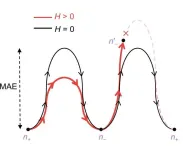Relapses in a common form of leukemia may be preventable following new research which has identified how the cancer develops resistance to first line treatments.
New research published in iScience by researchers from the University of Birmingham, the Institute of Cancer Research (ICR), Newcastle University, the Princess Maxima Centre of Pediatric oncology and the University of Virginia identified changes in a mutated form of acute myeloid leukemia (AML) samples from patients who relapsed after receiving FLT3 inhibitor treatment.
The team found that the resistant cancer had up-regulated multiple other signalling pathways to overcome the drug’s action, and that the genetic change was able to be replicated in lab tests.
These experiments revealed that by targeting RAS family proteins, using a small molecule inhibitor developed from a chemical library screen using the paratope of an inhibitory intracellular antibody by Terry Rabbitts’ team at the Weatherall Institute of Molecular Medicine University of Oxford and the ICR, increased signalling no longer rescued the cells from cell death.
The team identified that the transcription factors AP-1 and RUNX1 were at the heart of mediating drug resistance. The two factors cooperate and bind to their target genes together, but only in the presence of growth factor signalling. The drugs targeting FLT3 rewire the cell, resulting in the upregulation of other signalling pathway associated genes, which then restored AP-1 and RUNX1 binding. Drugging RAS, which is a key component in multiple signalling pathways, prevented this restoration of RUNX1 binding, and therefore signalling from growth factors no longer rescued the cancer cells from death.
Professor Constanze Bonifer from the Institute of Cancer and Genomic Sciences at the University of Birmingham, who has just taken up a position at the University of Melbourne, and is one of the senior authors of the paper said:
“The pharmaceutical industry had high hopes that drugs targeting aberrant growth factor receptors such as the FLT3-ITD would prevent people from relapse. However, cancer cells are smart, and rewire their growth control machinery to use other growth factors present in the body. Targeting RAS family members prevents the cancer from rewiring and using different signalling pathways to escape cell death.”
Targeting RAS blocks rewiring
The small molecule inhibitors used to target RAS in this study were developed using intracellular antibody technology. This technology involves screening a large number of antibody fragments to identify those which bind to the target protein in cells and prevent their protein-protein interactions. Small molecule inhibitors are can be screened from chemical libraries that interact with the parts of the target protein where these antibody fragments bind (the paratope). Due to the unparalleled natural specificity of these antibody fragments, this technology (called Antibody derived or Abd technology) can be used to target difficult to drug proteins and identify new parts of the protein which can be targeted to prevent protein-protein interactions.
Professor Terry Rabbitts from the Institute of Cancer Research who developed these drugs said:
“The strength of the Antibody-derived technology approach is that intracellular antibodies can selected to essentially any protein. In turn, their specific binding sites can be employed to select chemical compounds for drug discovery against hard to drug proteins. Mutant RAS was considered undruggable, but the Abd technology facilitated the development of the RAS-binding compounds used in the current study of cancer cell re-wiring. Abd technology will allow development of a new generation of drugs to hard-to-drug and intrinsically disordered proteins.”
AML with a FLT3-ITD mutation occurs in nearly 30% of all patients and is a highly aggressive disease with a poor prognosis. This genetic change causes the expression of a mutant growth factor receptor which is always active and therefore cancer cells expressing it grow uncontrollably. While inhibitors which specifically target the FLT3 protein are now in use in the clinic, patients treated with these inhibitors frequently relapse.
This work was funded by Leukaemia Research UK, the Medical Research Council, Blood Cancer Research UK, the Royal Society, the Wellcome and Cancer Research UK. The first author, Daniel Coleman is a John Goldman Fellow of Leukaemia UK.
Relapses in a common form of leukemia may be preventable following new research which has identified how the cancer develops resistance to first line treatments.
New research published in iScience by researchers from the University of Birmingham, the Institute of Cancer Research (ICR), Newcastle University, the Princess Maxima Centre of Pediatric oncology and the University of Virginia identified changes in a mutated form of acute myeloid leukemia (AML) samples from patients who relapsed after receiving FLT3 inhibitor treatment.
The team found that the resistant cancer had up-regulated multiple other signalling pathways to overcome the drug’s action, and that the genetic change was able to be replicated in lab tests.
These experiments revealed that by targeting RAS family proteins, using a small molecule inhibitor developed from a chemical library screen using the paratope of an inhibitory intracellular antibody by Terry Rabbitts’ team at the Weatherall Institute of Molecular Medicine University of Oxford and the ICR, increased signalling no longer rescued the cells from cell death.
The team identified that the transcription factors AP-1 and RUNX1 were at the heart of mediating drug resistance. The two factors cooperate and bind to their target genes together, but only in the presence of growth factor signalling. The drugs targeting FLT3 rewire the cell, resulting in the upregulation of other signalling pathway associated genes, which then restored AP-1 and RUNX1 binding. Drugging RAS, which is a key component in multiple signalling pathways, prevented this restoration of RUNX1 binding, and therefore signalling from growth factors no longer rescued the cancer cells from death.
Professor Constanze Bonifer from the Institute of Cancer and Genomic Sciences at the University of Birmingham, who has just taken up a position at the University of Melbourne, and is one of the senior authors of the paper said:
“The pharmaceutical industry had high hopes that drugs targeting aberrant growth factor receptors such as the FLT3-ITD would prevent people from relapse. However, cancer cells are smart, and rewire their growth control machinery to use other growth factors present in the body. Targeting RAS family members prevents the cancer from rewiring and using different signalling pathways to escape cell death.”
Targeting RAS blocks rewiring
The small molecule inhibitors used to target RAS in this study were developed using intracellular antibody technology. This technology involves screening a large number of antibody fragments to identify those which bind to the target protein in cells and prevent their protein-protein interactions. Small molecule inhibitors are can be screened from chemical libraries that interact with the parts of the target protein where these antibody fragments bind (the paratope). Due to the unparalleled natural specificity of these antibody fragments, this technology (called Antibody derived or Abd technology) can be used to target difficult to drug proteins and identify new parts of the protein which can be targeted to prevent protein-protein interactions.
Professor Terry Rabbitts from the Institute of Cancer Research who developed these drugs said:
“The strength of the Antibody-derived technology approach is that intracellular antibodies can selected to essentially any protein. In turn, their specific binding sites can be employed to select chemical compounds for drug discovery against hard to drug proteins. Mutant RAS was considered undruggable, but the Abd technology facilitated the development of the RAS-binding compounds used in the current study of cancer cell re-wiring. Abd technology will allow development of a new generation of drugs to hard-to-drug and intrinsically disordered proteins.”
AML with a FLT3-ITD mutation occurs in nearly 30% of all patients and is a highly aggressive disease with a poor prognosis. This genetic change causes the expression of a mutant growth factor receptor which is always active and therefore cancer cells expressing it grow uncontrollably. While inhibitors which specifically target the FLT3 protein are now in use in the clinic, patients treated with these inhibitors frequently relapse.
This work was funded by Leukaemia Research UK, the Medical Research Council, Blood Cancer Research UK, the Royal Society, the Wellcome and Cancer Research UK. The first author, Daniel Coleman is a John Goldman Fellow of Leukaemia UK.
END



